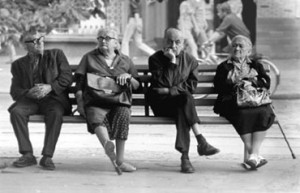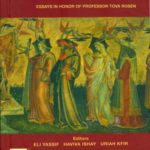Nu de wipkip en de hangplek voor de jeugd er verlaten bijliggen ~ De buurt als vitale omgeving voor ouderen
De vragen en dilemma’s die de vergrijzing oproept, reiken verder dan alleen betaalbare zorg. Zelfredzaam zijn is essentieel voor ouderen. Ondanks noodzakelijke zorg willen ze zo lang mogelijk zelfstandig thuis wonen. Wat daaraan bijdraagt zijn plekken om andere mensen te ontmoeten, een omgeving waar wat te beleven valt en voorzieningen binnen handbereik. Want ouderen die vaker de deur uit gaan, zijn zelfredzamer en blijven langer thuis wonen. De buurt doet er weer toe.
Nederland vergrijst in rap tempo. De komende 25 jaar nemen zeventig plussers het grootste deel van de bevolkingsgroei voor hun rekening. In percentages stijgt hun aantal van 17 % dit jaar naar 25 % in 2040. Over 15 jaar is één op de vier Nederlanders ouder dan 70 jaar. Vooruitlopend op een alsmaar uitdijende vraag naar zorg, sleutelt de overheid alvast stevig aan ons zorgstelsel. Verzorgingshuizen gaan dicht en er vindt een verschuiving plaats naar ambulante zorg aan huis. Daarmee wordt ingehaakt op de wens van het gros van de ouderen. Die stellen de pijnlijke beslissing om op hun oude dag te verkassen naar een zorgvoorziening het liefst zo lang mogelijk voor zich uit. Er is inmiddels een waaier aan mogelijkheden voorhanden om zelfstandig thuis te blijven wonen: hulp aan huis, aanpassingen aan de woning, domotica voor zorg op afstand en het inschakelen van familie en vrienden. Maar ondanks de beschikbaarheid van al deze mogelijkheden, zal de zorg de komende decennia onder druk blijven staan. Financieel, omdat de leeftijdsgroep in omvang zo sterk aan het toenemen is. Een andere reden is dat wij de komende decennia rekening moeten houden met een generatie ouderen die uit ander hout gesneden is. De impact daarvan zou wel eens groter kunnen zijn dan nu is te voorzien.
Ander slag ouderen
De nieuwe lichtingen zeventig plussers zijn babyboomers die dank zij gestegen welvaart gemiddeld genomen vitaler zijn, sportiever en langer gezond. Kritischer ook dan vorige generaties, opgegroeid in de zestiger jaren. Vrouwen hebben de emancipatie en een eigen carrière achter de rug, konden zich losmaken uit knellende tradities. Terwijl de groeiende groep migranten op oudere leeftijd hun traditionele wortels juist meer zijn gaan koesteren. Komende generaties ouderen zullen meer divers zijn met een steeds grotere variatie aan levensstijlen. En de hang naar autonomie en zelfredzaamheid zal een veel belangrijker rol spelen dan tot nu toe het geval was. Ook als zich ouderdomskwalen aandienen. Ze zijn over het algemeen koopkrachtiger en daardoor beter is staat om hun eigen oplossingen te regelen en daar soms ook zelf voor te betalen. Maar dat geldt zeker niet voor iedereen. Door de veranderingen in de zorg staan de zorgvoorzieningen en de professionele hulp sterk in de belangstelling. Dat heeft alles te maken met de stijgende zorgkosten die op ons afkomen. Want de komende generaties staan op het punt om heel oud te worden. Met als belangrijkste verschil dat ze op een andere manier oud willen worden. De clichés van volle zalen met bejaarden aan de bingo en grijze mannen in rokerige biljartzalen, is achterhaald. De zeventigplusser van nu en straks is kieskeuriger, stelt andere eisen en is ook individueler ingesteld. De vraag is of daar wel voldoende rekening mee gehouden wordt?
Paradigmawisseling
De discussie over de veranderingen in de zorg gaat met name over de financiële houdbaarheid en de ingrepen in het zorgstelsel. Voorzieningen in de zorg zijn gestoeld op de lichamelijke en fysieke beperkingen die mensen op leeftijd ondervinden en bieden ter ondersteuning een passend zorgaanbod. In dit artikel benaderen we de gevolgen van vergrijzing vanuit een breder kader dan alleen de zorg. In plaats van een toenemende behoefte aan zorg, nemen we de wensen en de capaciteiten van ouderen als uitgangspunt. Met als doel op langere termijn om ouderen zo lang mogelijk vitaal en zo zelfredzaam als maar kan, deel te laten nemen aan het dagelijks leven. Want daar is het de nieuwe generatie ouderen om te doen, die wil ook in hun derde levensfase de regie niet zo maar uit handen geven. De komende generatie ouderen zal, ook wanneer zich lichamelijke en geestelijke beperkingen aandienen, veel langer de behoefte hebben om maatschappelijk actief te blijven en aan het openbare leven deel te nemen. Dit brengt met zich mee dat we met een andere blik naar de gevolgen van vergrijzing moeten kijken. En voorwaarden moeten creëren die dit mogelijk maken. In het Engels wordt deze aandacht voor een actieve en gezonde oude dag aangeduid als healthy aging. Read more
Housing Problems (1935)
Dirección: Arthur Elton y Edgar Anstey
Duración: 17 mins.
Producción: Arthur Elton, E.H. Anstey
Compañía Productora: British Commercial Gas Association
Fotografía: John Taylor
El film explora el movimiento de familias desde tugurios urbanos a viviendas sociales consolidadas, y constituye una de las cintas claves del género documental de todos los tiempos, ya que fue la primera en mostrar a personas hablando directamente a la cámara acerca de sus problemas cotidianos. A través de dichos relatos, los directores construyen un argumento de denuncia y a la vez de esperanza, muy acorde al espíritu británico moderno del entre-guerras.
“Housing problems” | London, 1935 | Production Arthur Elton, E.H. Anstey, for the B.C.G.A.
Photography John Taylor, Recording York Scarlett |15 minutes, b/n, sound
“Made by Arthur Elton and Edgard Anstey in 1935 for the British Commercial Gas Association. Housing Problems was produced to draw attention to the state housing programmes. According to Erik Barnouw, the author of Documentary. A history of non-fiction film (1993), it was Grierson, one of the more renowned English documentary makers, who convinced the gas company of the importance of making the film: ‘…the demolition of derelict slums and their replacement by governement-finacing housing – a key demand of the socialist Labour party – would inevitably bring modernization and increased use of gas. Thus the company financed a film of blunt and moving protest”
by L. Ciacci, ‘Movies’ Column, Planum. The Journal of Urbanism planum.net
Bonaire.tv ~ Fuhikubo ta presentá
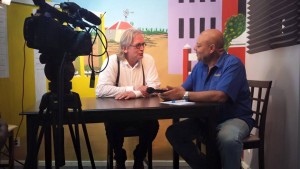 Eerst komen Andreina Vargas en Carlene Barrios aan het woord. Om dat gesprek te kunnen volgen is kennis van het Papiamentu nodig. Je kunt dat deel ook overslaan natuurlijk. Dan schuif je naar 34.32 min. en daar begint een heel ander verhaal. Een interview met Auke van der Berg (Rozenberg Quarterly) over de gang van zaken op Bonaire na 10.10.10.
Eerst komen Andreina Vargas en Carlene Barrios aan het woord. Om dat gesprek te kunnen volgen is kennis van het Papiamentu nodig. Je kunt dat deel ook overslaan natuurlijk. Dan schuif je naar 34.32 min. en daar begint een heel ander verhaal. Een interview met Auke van der Berg (Rozenberg Quarterly) over de gang van zaken op Bonaire na 10.10.10.
Den e prome parti di e programa aki nos ta kombersa ku Sra. Andreina Vargas i su yu muhé Carlene Barrios. Carlene ta sufri di e malesa ku jama ”Down Syndrome”.
Den e di dos parti di e programa nos ta kombersa ku ku Sr. Auke van der Berg ku ta un eskritor. Ela bin Boneiru spesialmente pa akumula informashon pa skirbi un buki tokante kon a bai ku Boneiru despues di e famoso fecha di 10-10-10.
Zie: http://bonaire.tv/?p=3343
The Caribbean Commons ~ Sexualities And Social Justice In The Caribbean
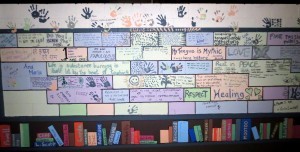
Sexualities in the Tent, Wall Mural at Bohemia, Port of Spain, Trinidad and Tobago, July 2013 Photo credit: Angelique V. Nixon.
Movements for sexual citizenship and equal rights for sexual minorities across the region (particularly in the Anglophone and Hispanophone Caribbean) are growing and have garnered local and international media attention. With recent court cases challenging discriminatory laws and the backlash and frenzy over a so-called “gay lobby” in the region, we are at a crucial juncture of visibility, misrepresentation, anti-sexual minority violence, increased activism, lawsuits, and ongoing survival. It is a vital time to respond to recent events critically and from myriad perspectives, as well as to reflect on these movements, make interventions, fight against misrepresentation and violence, and share strategies for community building and solidarity. What is the landscape of sexual minority activism across the region? Who are the regional activists and what are the most recent developments? How are these issues being represented in the media, popular culture, and cultural productions in the English-, Spanish-, French-, Creole- and Dutch-speaking Caribbean? How do we build community, forge resistance to violence and discrimination, and at the same time, demand equal rights and treatment under the law? Where is our hope and love in building community?
The Guardian ~ Cheap Solar Lamps Help Villagers Keep Their Health, And Cut Emissions
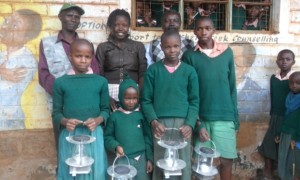
MwangaBora lamps are distributed to women’s groups to sell on, and they use income generated to set up small businesses Photograph: PR
In Kenya, where less than a quarter of the 45-million population has access to electricity, a solar lamp project is helping rural communities save money on expensive and harmful fuel while reducing carbon emissions. The Use Solar, Save Lives initiative was set up in 2004 by Evans Wadongo, 29, an engineer who experienced the dangerous effects of kerosene lamps growing up in a western Kenyan village. Studying close to an open flame, he was exposed to kerosene smoke, notorious for provoking breathing and vision defects, which left him with permanent eye problems.
Read more: http://www.theguardian.com/solar-mwangabora
Decolonizing Knowledge And The Question Of The Archive & Podcast ~ Decolonizing The University
This document was deliberately written as a spoken text. It forms the basis of a series of public lectures given at the Wits Institute for Social and Economic Research (WISER), University of the Witwatersrand (Johannesburg), at conversations with the Rhodes Must Fall Movement at the University of Cape Town and the Indexing the Human Project, Department of Sociology and Anthropology at the University of Stellenbosch. The nature of the events unfolding in South Africa, the type of audience that attended the lectures, the nature of the political and intellectual questions at stake required an entirely different mode of address – one that could speak both to reason and to affect.
Twenty one years after freedom, we have now fully entered what looks like a negative moment. This is a moment most African postcolonial societies have experienced. Like theirs in the late 1970s, 1980s and 1990s, ours is gray and almost murky. It lacks clarity.
Today many want to finally bring white supremacy to its knees. But the same seem to go missing when it comes to publically condemning the extra-judicial executions of fellow Africans on the streets of our cities and in our townships. As Fanon intimated, they see no contradiction between wanting to topple white supremacy and being anti-racist while succumbing to the sirens of isolationism and national-chauvinism. Many still consider whites as “settlers” who, once in a while, will attempt to masquerade as “natives”. And yet, with the advent of democracy and the new constitutional State, there are no longer settlers or natives. There are only citizens. If we repudiate democracy, what will we replace it with?
Our white compatriots might be fencing off their privileges. They might be “enclaving” them and “off-shoring” them but they are certainly going nowhere. And yet they cannot keep living in our midst with whiteness’ old clothes. Fencing off one’s privileges, off-shoring them, living in enclaves does not in itself secure full recognition and survival. Meanwhile, “blackness” is fracturing. “Black consciousness” today is more and more thought of in fractions. A negative moment is a moment when new antagonisms emerge while old ones remain unresolved.
It is a moment when contradictory forces – inchoate, fractured, fragmented – are at work but what might come out of their interaction is anything but certain.
It is also a moment when multiple old and recent unresolved crises seem to be on the path towards a collision.
Such a collision might happen – or maybe not. It might take the form of outbursts that end up petering out. Whether the collision actually happens or not, the age of innocence and complacency is over. When it comes to questions concerning the decolonization of the university – and of knowledge – in South Africa now, there are a number of clear-cut political and moral issues – which are also issues of fairness and decency – many of us can easily agree upon.
Demythologizing whiteness
One such issue has just been dealt with – and successfully – at the University of Cape Town. To those who are still in denial, it might be worth reiterating that Cecil Rhodes belonged to the race of men who were convinced that to be black is a liability.
During his time and life in Southern Africa, he used his considerable power – political and financial – to make black people all over Southern Africa pay a bloody price for his beliefs. His statue – and those of countless others who shared the same conviction – has nothing to do on a public university campus 20 years after freedom.
The debate therefore should have never been about whether or not it should be brought down. All along, the debate should have been about why did it take so long to do so.
To bring Rhodes’ statue down is far from erasing history, and nobody should be asking us to be eternally indebted to Rhodes for having “donated” his money and for having bequeathed “his” land to the University. If anything, we should be asking how did he acquire the land in the first instance.
Arguably other options were available and could have been considered, including that which was put forward late in the process by retired Judge Albie Sachs whose contribution to the symbolic remaking of what is today Constitution Hill is well recognized.
But bringing Rhodes’ statue down is one of the many legitimate ways in which we can, today in South Africa, demythologize that history and put it to rest – which is precisely the work memory properly understood is supposed to accomplish.
For memory to fulfill this function long after the Truth and Reconciliation paradigm has run out of steam, the demythologizing of certain versions of history must go hand in hand with the demythologizing of whiteness. This is not because whiteness is the same as history. Human history, by definition, is history beyond whiteness.
Human history is about the future. Whiteness is about entrapment. Whiteness is at its best when it turns into a myth. It is the most corrosive and the most lethal when it makes us believe that it is everywhere; that everything originates from it and it has no outside. We are therefore calling for the demythologization of whiteness because democracy in South Africa will either be built on the ruins of those versions of whiteness that produced Rhodes or it will fail.
Read more (PDF-file): http://wiser.wits.ac.za/AchilleMbembe
Podcast: https://archive.org/details/AchilleMbembeDecolonizingTheUniversity
